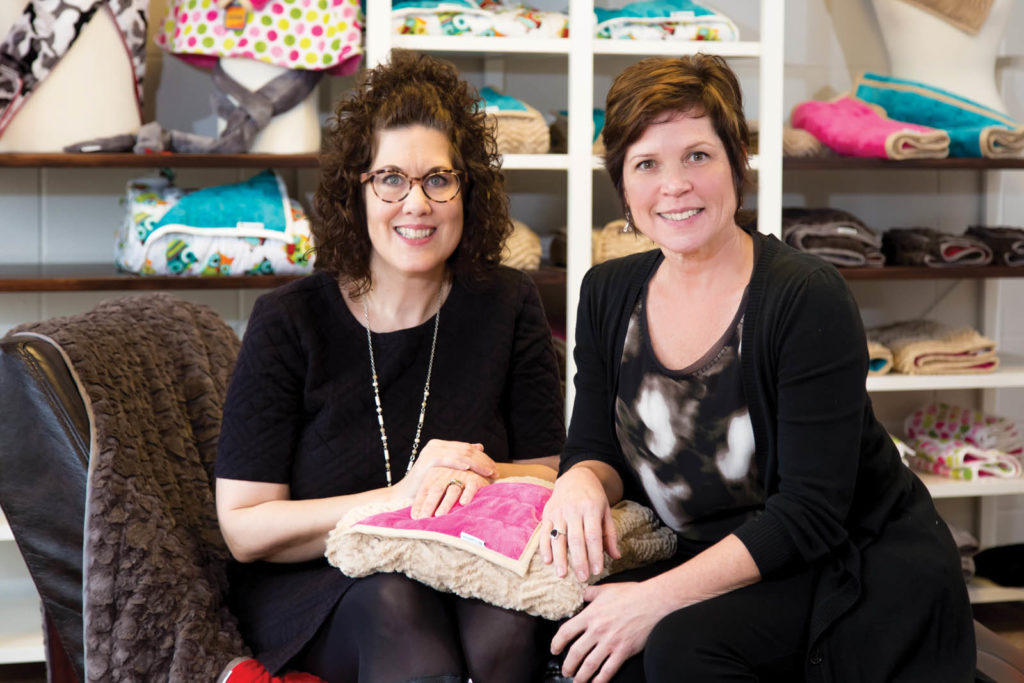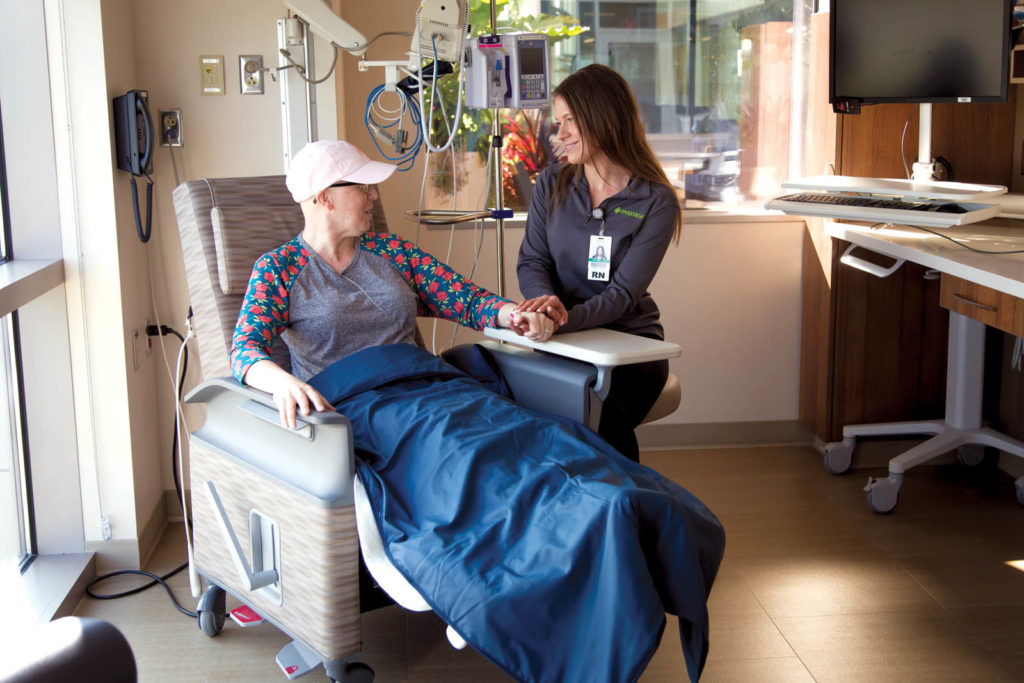By Holly Eamon

Whether they’re being touted by a celebrity, promoted by major retailers or recommended by a friend, weighted blankets are the latest must-have household item. But as their transformative capabilities are increasingly introduced to and embraced by medical patients and professionals, their relevance is poised to long outlive similar fads—thanks to the determination of two moms in Indiana.
Armed with preliminary research proving the benefits of their groundbreaking, patent-pending SmartWeight® technology, CapeAble founders Marna Pacheco and Susan Hickok are looking to expand use of their weighted products throughout sectors within the medical industry and beyond. Setting sights high is nothing new for the duo, whose journey to this point has been anything but predictable.
Accidental solutions
Pacheco and Hickok became official business owners in 2016 but still refer to themselves as accidental entrepreneurs. “We did not set out to start a company,” Pacheco says. They were instead seeking better stress-relieving options for their adopted daughters, who both experienced severe early childhood trauma. While searching for weighted products at the suggestion of her daughter’s occupational therapist, Pacheco recalls being appalled at what was available. “My daughter deserved better,” she says.
Pacheco made a weighted cape that was not only more visually appealing than the products she found but also allowed her daughter to move freely while experiencing its calming effects. Families in relatable situations took notice, and when she couldn’t keep up with their requests for similar products, Pacheco enlisted Hickok’s help.
Hickok’s fashion design experience and Pacheco’s education and sales background didn’t easily align with the demands of starting a business. “I can’t think of any challenges we didn’t have to overcome,” Pacheco says. “If we knew then what we know now, I’m not sure if we would have done it, but moms don’t give up; they find solutions.”
A lesson in science
Their first step was to better understand the problem they had unintentionally begun to unravel. Conclusive research on weighted blankets didn’t exist and they were determined to change that.
Weighted blankets were introduced in the mental health community nearly 30 years ago as an alternative to tie-down restraints used on adults with extreme behavior. When demand for weighted blankets increased from parents of children with autism, the professional community adapted a formula taken from the spinal health field for backpacks and purses. Centered on body weight percentage, the formula emphasized the total weight of the blanket in relation to the weight of the person, which caused the blanket to be heavier than necessary and act more like the restraint it was meant to replace.
A current comprehension of neuroscience was also missing from the equation, Pacheco says. To stimulate a calming, neurological response, the product’s weight should maximize nerve contact. This requires a shift in focus from the total weight of the person and the blanket to the weight per square inch that is touching the body—a deviation Pacheco and Hickok spearheaded with the development of SmartWeight® technology. Following the science of deep touch pressure, this weight distribution method allows them to use less weight more effectively not only in blankets but also in wearables such as shoulder wraps, scarves, sashes and capes.
CapeAble products are embedded with two-inch pockets (the smallest in the industry) filled with BPA-free, extra clean recycled glass beads that evenly distribute weight, allowing them to conform to any shape or body size and compress evenly. The weight does not shift, no matter how the wearer moves, allowing the product to stay in constant contact with more nerves.

Portable security
The company’s original line of products are made with minky fabric, using one-piece construction, and are both machine washable and dryable. “We use minky because of its durability,” Pacheco says, noting appreciation for its texture and vibrant colors.
“You need alternatives so you’re not carrying a blanket around with you all day,” she explains. “If you’re in an upright position at your desk and having a stressful day or are anxious on an airplane, you can wear a shoulder wrap that reminds your muscles to relax and it is also aesthetically pleasing.”
Their magnetic focus fidgets—hidden magnets strategically wrapped in minky fabric—are designed to help the user relax and be present, whether an executive in a corporate board meeting or a child struggling to pay attention in school.
“What’s really important is that these products are easy to use, wear and care for,” Pacheco says. “Our society is hurting today; people are overscheduled and overworked and experiencing anxiety as well as sleep difficulties. These products are not just for people with a specific diagnosis—they are truly for everyone with a central nervous system.”
To your health
It was also important for Pacheco and Hickok to make their products available in medical settings, which required them to incorporate a medical-grade fabric. Using Herculite’s Sure-Chek® Fusion Healthcare fabric, they launched CapeAbleCare, their second line of products featuring the first medical-grade, therapeutic weighted blanket of its kind. To meet hospital standards, the fabric offers moisture barrier and antimicrobial protection, and is anti-static, flame-resistant, stain-resistant, odor-resistant, hypoallergenic, easy to maintain, comfortable and resistant to popular disinfectants.
Once their blanket secured a presence in medical settings, Pacheco and Hickok sought data supporting its aid—and earlier this year, they got it. The first-ever Institutional Review Board (IRB)-controlled study of this product, conducted by a research hospital, showed strong evidence that use of the blanket not only reduced oncology outpatients’ anxiety and pain but also helped them better tolerate their infusions. Following the completion of the study, all participating patients chose to continue using the blanket during their infusions.
The research also confirmed that the weight per square inch is more important than the blanket’s or person’s total weight, shattering previous theories. Even with this finding, the total weight formula is what’s stuck in people’s minds, Pacheco says, making marketing more difficult than the actual manufacturing. Total weight is factored into CapeAble’s blankets, with gentle, preferred and extra weight options available—but only to cater to the physical abilities of the wearer as they lift and carry the product.
“This is why we ask for a customer’s age and not their body weight,” Pacheco says. “The preferred weight is what we prefer to sell because it’s safe and better for the user. The preliminary study supports this, but it’s been hard to change people’s mindsets.”
Weighing the future
CapeAble products will be tested in additional IRB-controlled studies. Because SmartWeight® causes the brain to release serotonin, customers with Parkinson’s disease, insomnia, PTSD, ADHD or any stress-related symptoms can benefit from its comforting properties, Pacheco says.
While the blankets are already being used by teachers, families, hospitals and medical professionals such as dentists and ophthalmologists, “We would love to see one on every bed or couch and in every classroom and medical facility,” Pacheco says. “We changed the way weight has been used in the past and we know so much more today about how we can help both children and adults. My daughter’s inspiration is touching thousands of people, and I’m grateful that I get to be her voice to make a difference in people’s lives.”
Holly Eamon is an editor and writer based in Minneapolis, Minn.
All CapeAble products are made in a 5,000-square-foot facility in Fort Wayne, Ind. They’re sold online as well as in a retail store attached to the facility. Co-owners Marna Pacheco and Susan Hickok employ just under 10 people and prioritize flexibility in their schedules to allow employees to work around their family commitments. “We feel so fortunate to be able to make this product here and have full quality control to make sure our customers are getting the best product available,” Pacheco says. “We want to continue to grow and develop more products to help those who are so in need of it.”
 TEXTILES.ORG
TEXTILES.ORG


